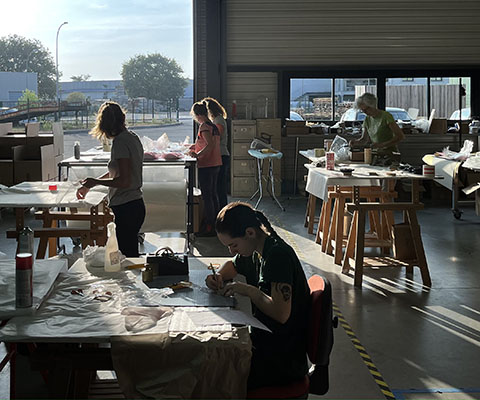
Conceived by the entire AuMa team, this short phrase, known as "purpose", highlights the company's identity, its mission, and its contribution to the challenges of sustainable development.
It is around this vision that the company wishes to flourish, accompanied by its various stakeholders: customers, suppliers, partners, and employees.
Certified by Ecovadis and B Corp, AuMa reaffirms its commitment to a more responsible and sustainable economy. These rigorous certifications promote transparency in business models and enable us to join a community of companies that share common values.
- 1.Listening : During the initial listening phase, project managers encourage customers to opt for eco-design. The company's material library and the expertise of project managers guide them to use materials from identified environmental sources, with low transport requirements.
- 2.Design : In the second phase, the design phase, the engineering, and design department strives to propose concepts that are easy to transport, easy to dismantle and not too bulky, while keeping design as the priority.
- 3.Production : During this phase, the company sorts its waste and bans certain materials. New suppliers are selected based on their commitment, and old suppliers are made aware of the need to support AuMa in its efforts. Some are Entreprise Patrimoine Vivant-certified, and more generally they all have developed an appetite for CSR.
- 4.Logistics : For the fourth phase, logistics, AuMa favors environmentally friendly transport and eco-designed sub-packaging, while respecting its customers deadlines.
- 5.Installation : In the fifth stage, the installation of scenography on its customer sites, the company is committed to planning as closely as possible to the real needs of the project, raising the awareness of its partners and optimizing material and human resources in a reasoned way, as well as transport (using the train, for example). What's more, the company's vehicles are 100% electric to minimize our carbon footprint.
- 6.Impact : Conscious of our impact, we strive to create sets with a controlled environmental footprint. To understand and reduce this impact, AuMa has its own footprint calculator. This allows us to assess the project's scale, analyze its composition, and consider improvements. AuMa can also design deconstruction guidelines or proposals for the set's second life.

Obtaining B Corp certification is much more than just a label—it is a recognition of our commitment to placing positive impact at the heart of our business.
By joining this global community of purpose-driven companies, AuMa affirms its dedication to building a more sustainable world by adhering to rigorous standards of social and environmental performance, as well as transparency.
In practical terms, this certification validates our efforts toward more responsible production: carefully sourced materials, waste reduction, eco-design of our decorations, and strong engagement with our stakeholders.
At AuMa, we have always believed that creativity, craftsmanship, and positive impact can go hand in hand. This recognition strengthens our mission and inspires us to go even further.